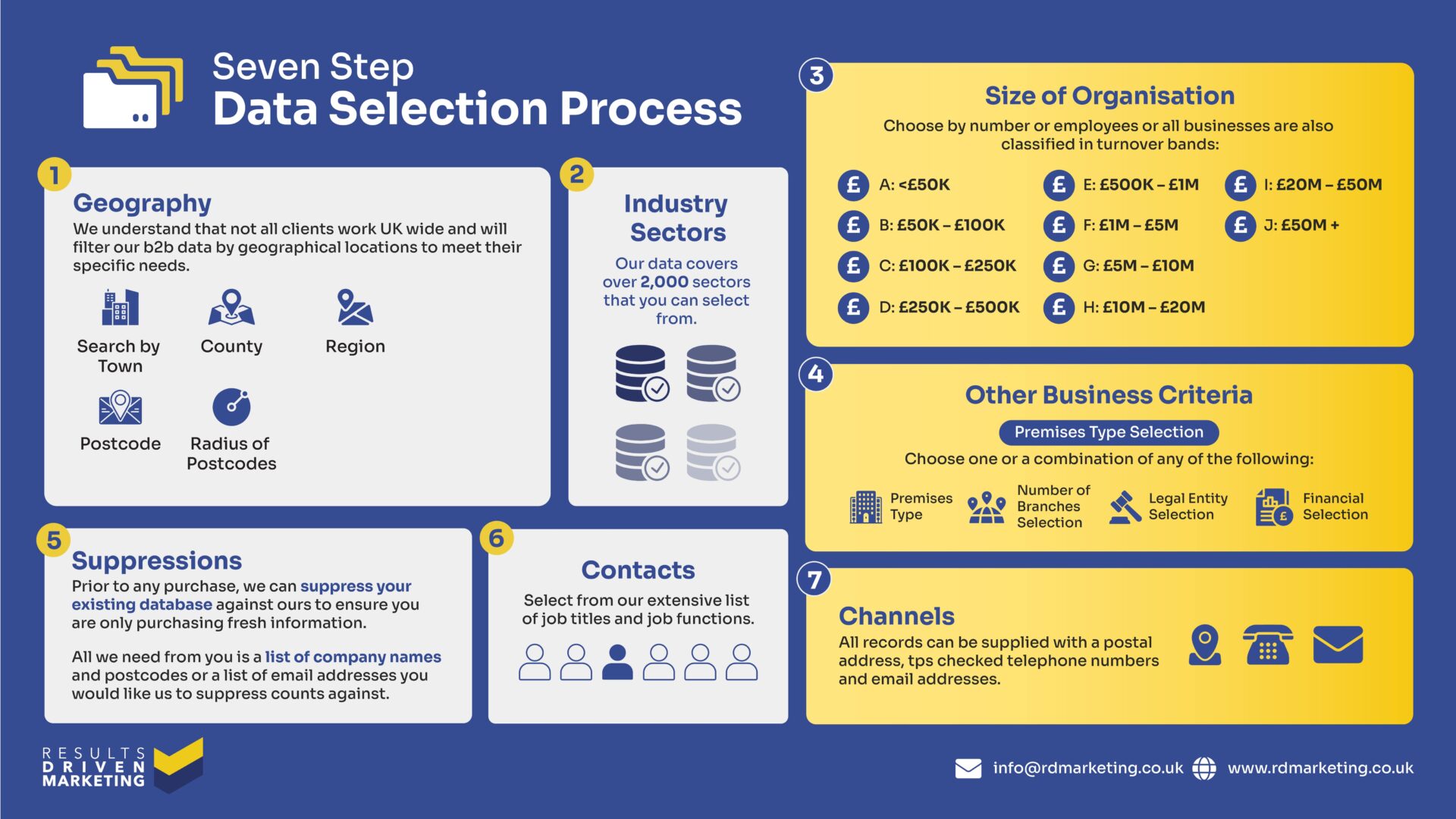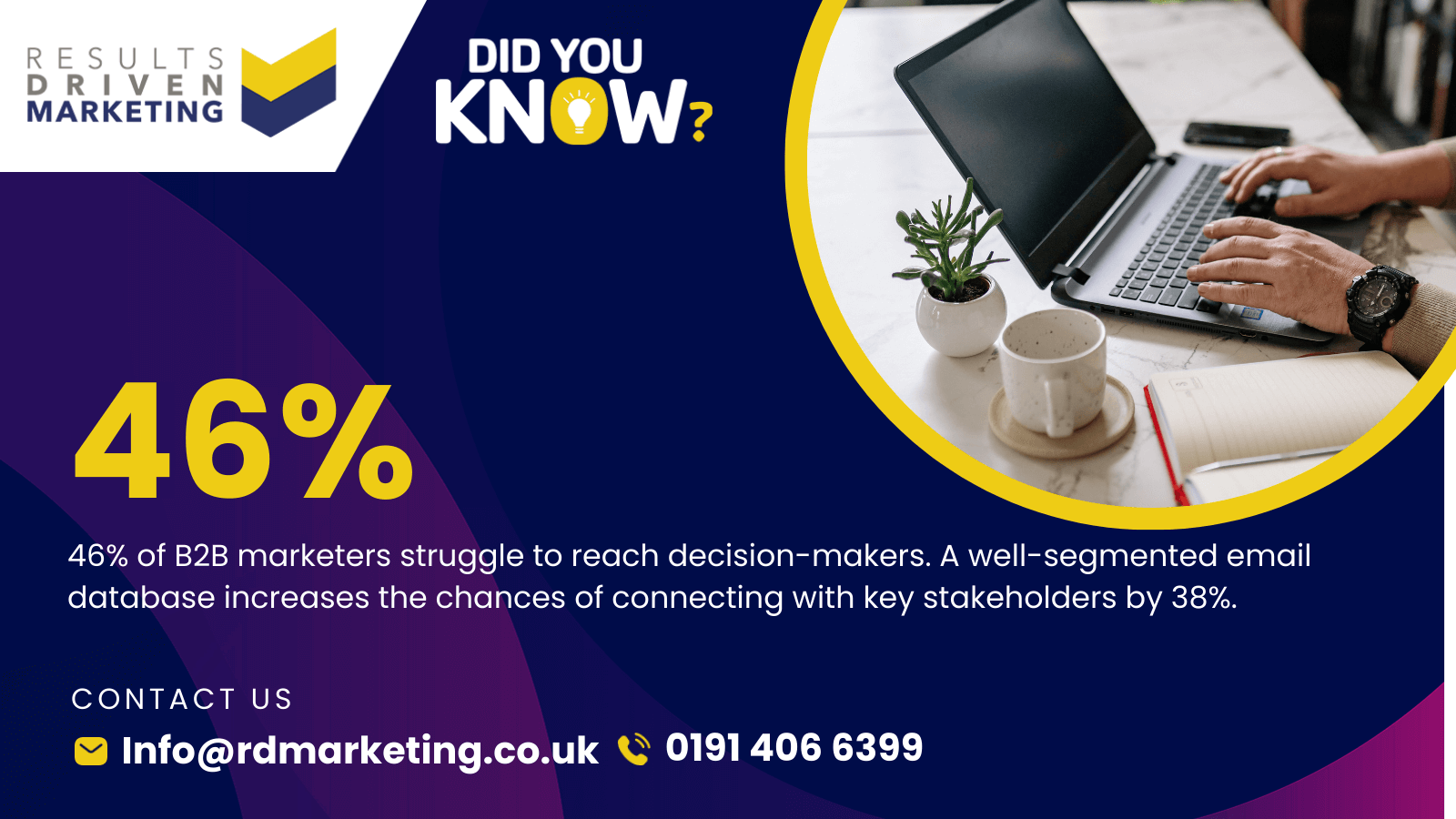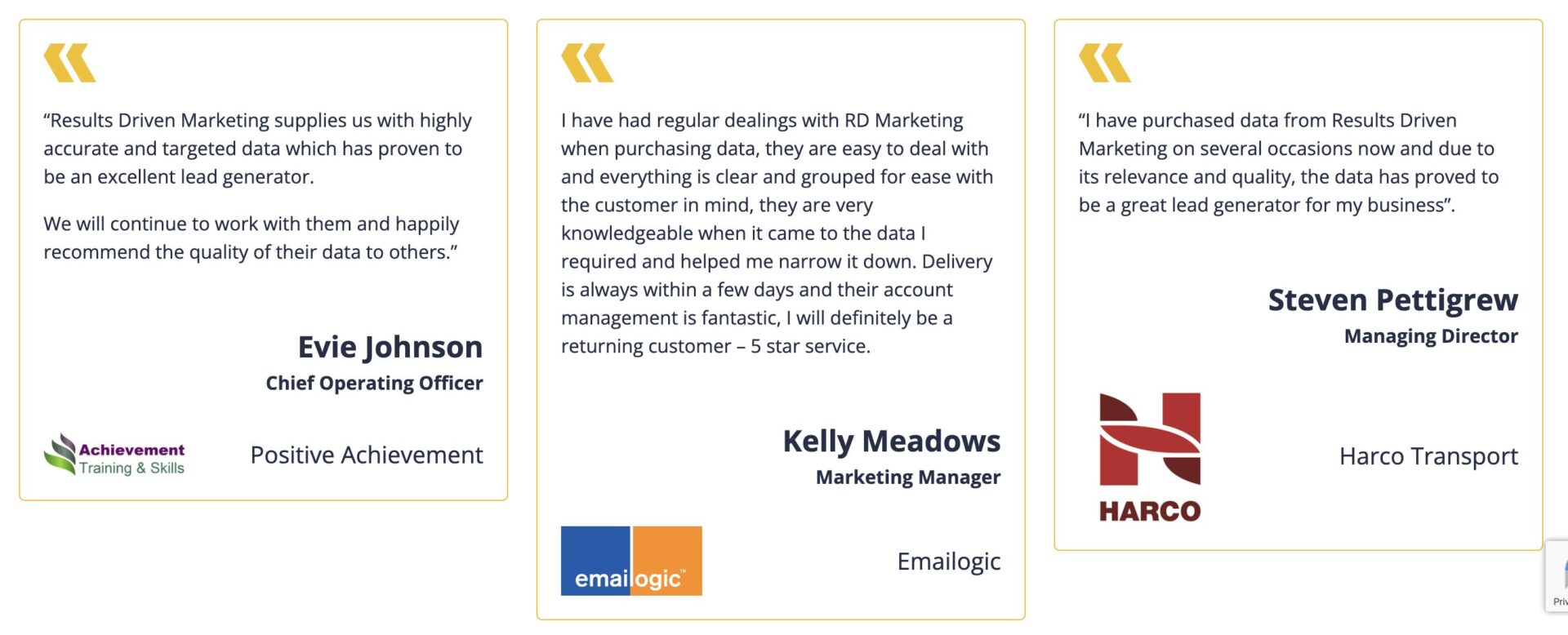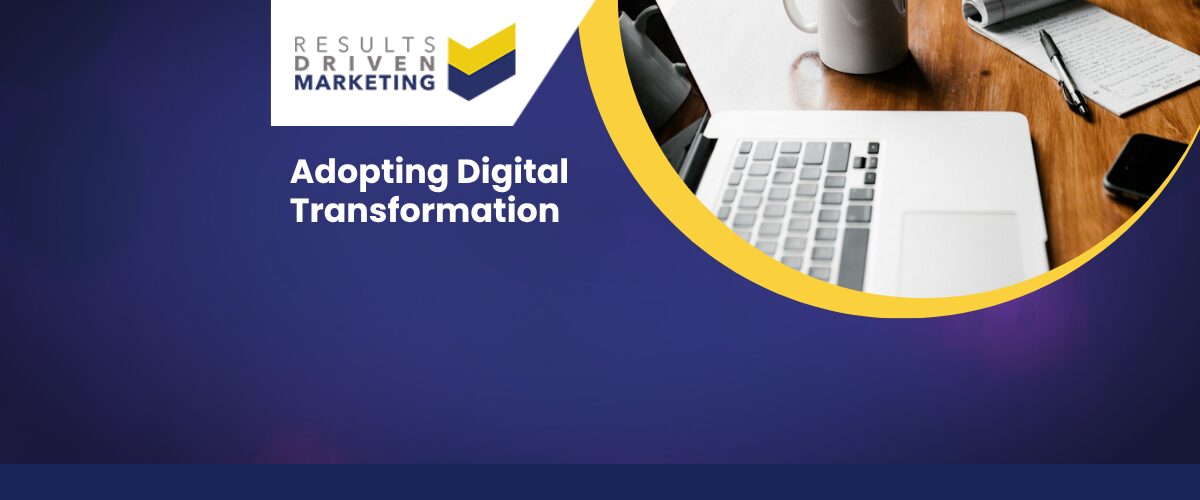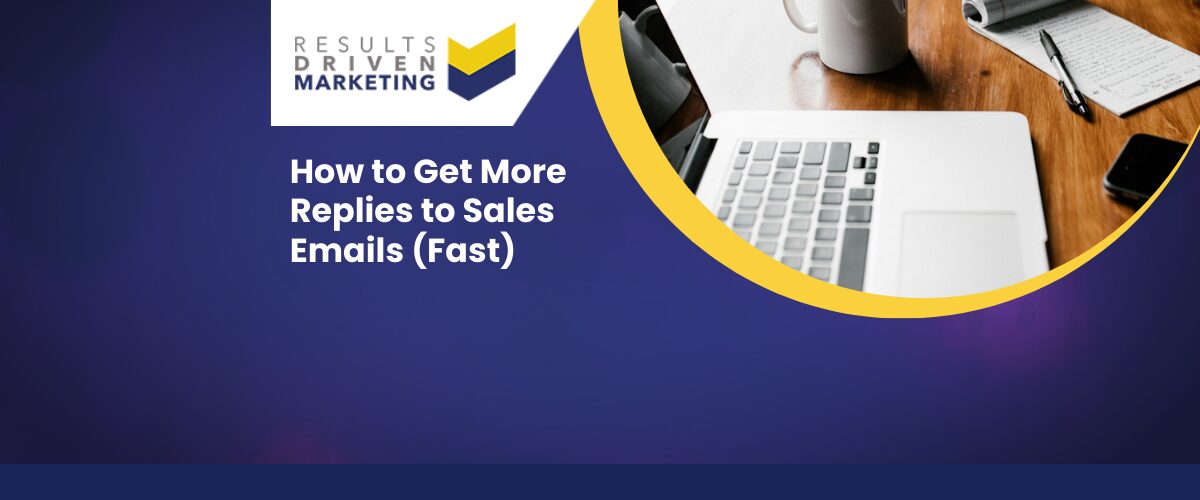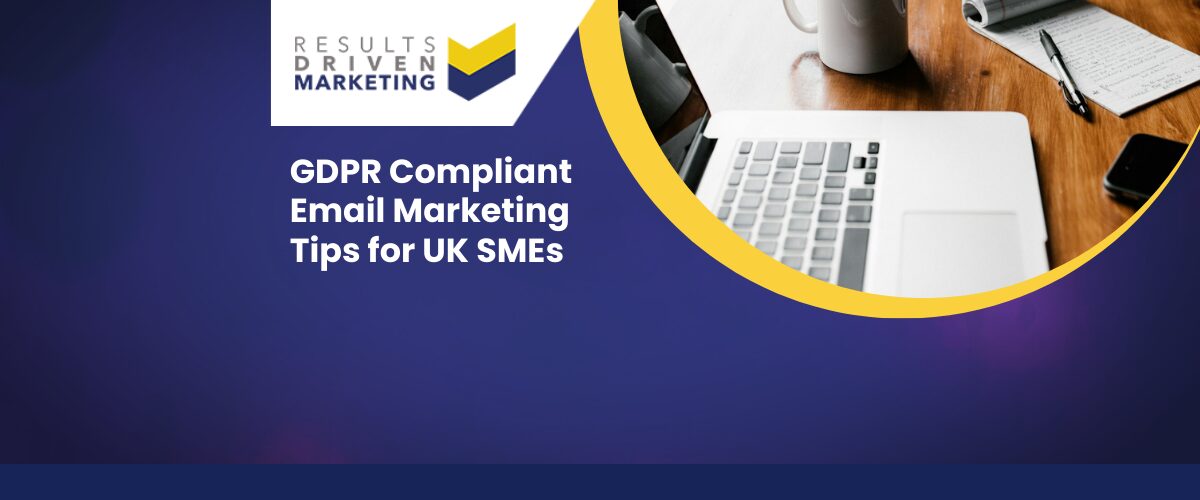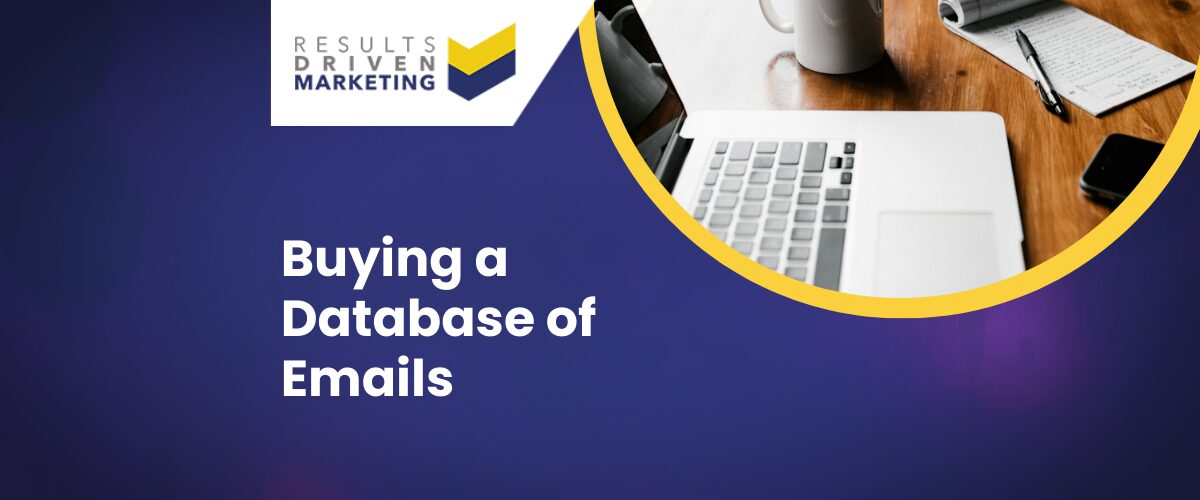
Buying a Database of Emails That Delivers Real Results
Buying a database of emails can be a game-changing strategy for businesses looking to expand their reach and connect directly with their target audience. Whether you’re a seasoned marketer or just starting out, understanding the ins and outs of purchasing email lists is crucial to making informed decisions that drive results.
In this article, we’ll walk you through everything you need to know about buying a database of emails, from what to look for in a reliable provider to how this tool can help you achieve your marketing goals. We’ll also explore how targeted email databases can solve common challenges like lead generation, time constraints, and missed opportunities to connect with decision-makers.
At Results Driven Marketing, we specialise in providing accurate, GDPR-compliant email databases tailored to your specific needs. Our solutions are designed to help you save time, boost ROI, and reach the right people with ease. Whether you’re aiming to grow your business, launch a new product, or increase conversions, the right email database can help you get there faster.
Table of contents:
What is a Database of Emails?
A database of emails is a carefully curated marketing list that provides businesses with direct access to senior contacts within SMEs. It typically includes key information such as email addresses, job titles, industries, and sometimes additional details like company size or location. This tool is designed to help companies promote their products and services to the right audience efficiently and effectively.
Why is this important? In today’s competitive business landscape, reaching decision-makers can be a challenge. A database of emails streamlines this process, allowing you to connect directly with the people who influence purchasing decisions. By leveraging this resource, you can:
- Save Time: Focus your efforts on high-value prospects instead of casting a wide net.
- Boost Campaign Performance: Tailor your marketing messages to a highly relevant audience.
- Increase ROI: Direct outreach to the right contacts often leads to better conversions and stronger relationships.
Understanding and using a database of emails ensures your marketing efforts are targeted, personalised, and impactful—key ingredients for the success of any business.
Why Buying a Database of Emails Represents a Big Opportunity
Buying a database of emails offers a tremendous opportunity for businesses looking to supercharge their marketing efforts. In an increasingly competitive landscape, reaching the right people at the right time can be the difference between standing out and getting lost in the noise. Here’s why investing in a database of emails is such a game-changer:
1. Direct Access to Decision-Makers
A high-quality email database gives you direct access to senior contacts within SMEs, putting your message in front of the people who hold the purchasing power. This targeted approach maximizes your chances of engagement and conversion.
2. Save Time and Resources
Building an email list from scratch can be time-consuming and resource-intensive. By purchasing a ready-to-use database, you gain instant access to high-quality leads, allowing you to focus on crafting compelling campaigns instead of searching for contacts.
3. Personalised Marketing at Scale
With detailed information about your target audience, you can create highly personalised campaigns that resonate. Personalised emails are proven to drive better open rates, click-through rates, and overall engagement.
4. Expand Your Market Reach
Whether you’re launching a new product or entering a new market, a database of emails helps you connect with a broader audience quickly and effectively.
5. Boost ROI
By targeting your marketing efforts to a curated list of senior contacts, you reduce wasted effort and improve the return on your investment.
Investing in a database of emails is more than just buying a list—it’s opening the door to new opportunities, stronger relationships, and measurable business growth. It’s a smart, scalable solution for businesses ready to take their marketing to the next level.
Who Uses a Database of Emails?
When businesses buy a database of emails, they’re equipping themselves with a powerful tool to connect directly with senior purchasing decision-makers within UK SMEs. But who benefits most from leveraging these marketing lists? Let’s explore the key users:
1. B2B Marketers
B2B marketing teams rely on email databases to drive targeted campaigns that resonate with decision-makers. By tailoring their outreach to specific industries, roles, or locations, they can generate high-quality leads and boost conversions.
2. Sales Teams
Sales professionals use databases of emails to streamline their lead generation efforts. With access to key contacts, they can bypass gatekeepers and focus their energy on building relationships with the people who matter most.
3. Service Providers
From IT consultants to digital marketers, service providers use email databases to showcase their expertise to SMEs that need their solutions. This targeted approach ensures they reach businesses most likely to benefit from their offerings.
4. Event Organisers
Whether promoting trade shows, webinars, or networking events, organisers use email databases to invite the right attendees. Reaching decision-makers increases the chances of securing valuable participants and partners.
5. Recruitment Agencies
Recruiters rely on email databases to connect with hiring managers and business owners, helping them place top talent faster and more efficiently.
6. Product Manufacturers and Suppliers
Companies in manufacturing and supply industries use email databases to promote their products directly to procurement teams and decision-makers, ensuring their solutions reach the right audience.
7. Startups and Small Businesses
For smaller companies with limited resources, buying a database of emails is a cost-effective way to launch targeted campaigns, build brand awareness, and compete with larger businesses.
No matter your industry or business size, a database of emails is an invaluable resource for connecting with the right people, promoting your products or services, and driving measurable results. It’s a versatile tool that empowers businesses to target, engage, and grow.
Why Buy a Database of Emails from Results Driven Marketing?
If you’re ready to take your marketing efforts to new heights, there’s no better place to buy a database of emails than Results Driven Marketing. We specialize in providing accurate, GDPR-compliant email lists that connect you directly with senior purchasing decision-makers within UK SMEs. Here’s why businesses trust us:
1. High-Quality, Accurate Data
Our email databases are meticulously verified and regularly updated, ensuring you’re reaching the right people every time. No wasted effort on outdated or incorrect information—just high-quality leads ready to engage with your products or services.
2. Tailored to Your Needs
Every business is different, so we offer customisable databases to suit your specific marketing goals. Whether you’re targeting a particular industry, region, or company size, we’ll provide the perfect list to help you succeed.
3. Fully GDPR-Compliant
We take compliance seriously. All our email databases are fully GDPR-compliant, giving you peace of mind while keeping your campaigns legally and ethically sound.
4. Cost-Effective Solutions
Building an email list in-house can be time-consuming and expensive. With Results Driven Marketing, you get instant access to high-quality data at a fraction of the cost, helping you focus your resources on crafting compelling campaigns.
5. Expert Support at Every Step
Our team is here to help you get the most from your investment. Whether it’s advice on targeting, tips for optimising your campaigns, or technical support, we’re just a call or email away.
6. Proven Success Across Industries
Businesses from various sectors have seen measurable success using our databases. From boosting lead generation to improving ROI, our clients consistently achieve their goals. Don’t just take our word for it—explore their stories on our Testimonials Page.
7. Seamless Integration with Marketing Services
Pair your database with our email marketing platform, Responder, or take advantage of our managed email marketing services. These tools and services make it even easier to execute successful campaigns.
When you choose to buy a database of emails from Results Driven Marketing, you’re not just getting a list—you’re investing in a strategic tool that drives real results. Ready to see the difference a high-quality database can make? Contact us today and explore the potential impact with our ROI Calculator. Let’s help your business thrive!
How a Marketing Email Database Drives Campaign Success
A marketing email database is more than just a collection of contacts—it’s the foundation of targeted, results-driven campaigns. With the right data at your fingertips, you can connect directly with senior decision-makers, cut down wasted spend, and achieve a higher return on investment from every email you send.
What Makes a Marketing Email Database Valuable
A high-quality marketing email database provides:
-
Accurate and up-to-date contacts – ensuring your messages land with the right people.
-
Segmentation options – filter by job role, industry, region, or company size.
-
Multi-use licences – allowing you to run multiple campaigns without restriction.
-
GDPR-compliance – so your outreach is both effective and legally sound.
This level of detail and assurance gives businesses the confidence to launch campaigns that resonate.
Benefits of Using a Marketing Email Database
When applied correctly, a marketing email database becomes a strategic tool that helps you:
-
Generate quality leads by focusing on verified senior contacts.
-
Personalise campaigns for better engagement and stronger relationships.
-
Save time and resources compared to building a list manually.
-
Expand into new markets quickly with targeted regional data.
-
Boost campaign ROI by reducing bounce rates and focusing on relevant prospects.
Best Practices for Maximum Impact
To unlock the full potential of a marketing email database, businesses should:
-
Regularly cleanse and update data to maintain accuracy.
-
Use segmentation to tailor content for different industries or job roles.
-
Pair email outreach with telemarketing or direct mail for a multi-channel approach.
-
Monitor key metrics like open and click-through rates to refine campaigns.
👉 In short, a marketing email database isn’t just a list—it’s a powerful resource that helps businesses target smarter, build stronger relationships, and grow faster.
What the Best Email Database Looks Like for UK B2B
Choosing the best email database isn’t about biggest file size — it’s about send-ready quality, relevance to your ICP, and clear usage terms that let you scale campaigns with confidence.
Must-have essentials
-
ICP match, not just count: Industry, seniority, region, and company size aligned to your offer.
-
Recency & upkeep: A clear refresh cadence and ongoing maintenance to reduce decay.
-
Segment depth: Job role/department, geography, company size, and line-of-business fields for precise slicing.
-
Campaign-ready formatting: Clean CSV/XLSX, documented field map, UTF-8 encoding, and consistent job title standards.
-
Multi-use licence: Run multiple broadcasts over your campaign period without re-licensing friction.
-
GDPR & PECR alignment: Lawful basis for B2B outreach, opt-out handling, and data-subject support.
Red flags to avoid
-
Vague provenance: No clarity on sources or refresh process.
-
“One big file” thinking: Limited fields that block segmentation or ABM.
-
No accuracy benchmark: No stated bounce threshold or replacement policy.
-
Samples that aren’t samples: Column headers only, or masked fields that hide quality issues.
Quick selector matrix
-
Audience: Industries • Roles • Regions • Company size
-
Use case: Cold outreach • Event invites • Product launch • ABM
-
Data fields required: Email • Phone • Address • LOB tags • Employee count • Turnover
-
Compliance notes: Exclude sole traders/partnerships for B2B email; opt-out link required
-
Licence & support: Multi-use term • Suppression matching • Named support contact
-
Success criteria: Bounce ≤10% (hard) • CTR/lead targets • Replacement or pro-rata refund if thresholds missed
How we operationalise “best”
We scope your best email database around your ICP, provide a real sample (not just headers), match your suppression file, and deliver in a campaign-ready format mapped for Responder or your platform of choice. Prefer done-for-you? Our managed team can design, broadcast, and report end-to-end.
Deliverability Blueprint: How to Use a New Database of Emails Safely
Bringing a new database of emails into your stack is exciting—but getting deliverability right is what turns that list into pipeline. Use this fast, practical blueprint to protect your sender reputation and maximise results from day one.
Prepare your sending setup
-
Authenticate your domain: Ensure SPF and DKIM are correctly set; add a DMARC policy (start with p=none, monitor, then tighten).
-
Use a dedicated sending domain/subdomain: Keep transactional and marketing streams separate to protect your main domain’s reputation.
-
Warm up gradually: Start with a small, tightly targeted segment (engagement-friendly audiences) and scale volume over 2–3 weeks.
Clean and segment the data
-
Run a quick hygiene pass: Remove obvious formatting issues and duplicates; align job titles into consistent buckets (e.g., Owner/MD, Ops, Finance, Marketing, IT).
-
Match suppressions: Deduplicate against your CRM, opt-outs, and previous campaign suppressions before upload.
-
Create smart segments: Slice by industry, seniority, region, and company size so you can test relevance and cadence confidently.
Send in controlled waves
-
Wave 1 (day 1–3): 1–3k contacts tops (or ~5–10% of list), highest-likelihood responders.
-
Wave 2 (day 4–7): Double volume if metrics hold (opens/clicks stable, hard bounces ≤10%, complaints minimal).
-
Wave 3+: Roll out to additional segments; maintain pauses between waves to review results.
Write for the inbox
-
Subject lines: Clear, benefit-led, under ~50 characters. Avoid spammy phrasing and excessive punctuation.
-
Body: Keep it specific to the segment—reference role/industry pains, show one primary outcome, one clear CTA.
-
Design: Lightweight HTML or simple text-leaning templates help with inbox placement and mobile readability.
Measure, then tighten the loop
-
Core metrics to watch: Delivery rate, hard bounces, opens, clicks, reply rate, spam complaints (and by segment).
-
Iterate: If a segment underperforms, adjust the message angle or cadence before increasing volume.
-
Maintain hygiene: Remove persistent non-engagers over time to keep your reputation healthy.
Compliance and good-neighbour policy
-
GDPR/PECR alignment: Target business contacts, include clear company identity, purpose, and an easy opt-out in every send.
-
Respect opt-outs fast: Update suppression files promptly and re-check before each broadcast.
-
Document your basis and process: Keep a simple record of data source, selection criteria, and outreach rationale.
Power moves with Results Driven Marketing
-
Responder-ready files: We deliver clean, campaign-ready data mapped for Responder (or your platform), with suppression matching on request.
-
Managed option: Prefer white-glove? Our team can warm the domain, set authentication, segment, design, broadcast, and report—end-to-end.
-
Bounce protection: If hard bounces exceed your agreed threshold, we’ll sort replacements or pro-rata credit per your terms—keeping campaigns on track.
What Our Clients Say About Buying a Database of Emails
When businesses choose to buy a database of emails from Results Driven Marketing, they’re equipping themselves with a powerful tool for targeted marketing success. But don’t just take our word for it—our clients’ testimonials speak volumes about the quality and impact of our email databases.
Here’s a snapshot of what our customers have achieved with our tailored email lists:
From increasing lead generation to boosting ROI, our clients consistently see measurable results that drive their businesses forward.
Want to hear more success stories? Visit our Testimonials Page to discover how businesses across industries have benefited from our data-driven solutions.
Ready to calculate the potential impact of a database of emails on your marketing efforts? Try our ROI Calculator and see how you can achieve measurable success today!
How Businesses Are Leveraging a Database of Emails to Their Benefit
When businesses buy a database of emails, they gain access to one of the most versatile tools for reaching their target audience. Companies across industries are tapping into the power of these databases to drive results, grow their customer base, and improve ROI. Here’s how:
1. Generating High-Quality Leads
B2B marketers and sales teams use email databases to connect directly with decision-makers who have the authority to purchase their products or services. This targeted approach ensures that their efforts are focused on high-potential leads, saving time and boosting conversion rates.
2. Building Stronger Relationships
A database of emails allows businesses to send personalised and relevant messages to their audience. Whether it’s through tailored offers, updates, or industry insights, companies are leveraging email databases to nurture relationships with prospects and customers alike.
3. Expanding Into New Markets
For businesses looking to grow, email databases provide a shortcut to entering new markets. By targeting specific industries, locations, or company sizes, they can quickly connect with the right audience and establish a presence in untapped regions.
4. Launching Products or Services
A new product launch is an opportunity to make a big impact, and businesses are using email databases to spread the word directly to potential customers. With segmented lists, they can tailor their messaging to highlight the most relevant benefits for each group.
5. Improving Marketing ROI
By purchasing a high-quality database of emails, businesses can cut down on wasted marketing spend. Instead of casting a wide net, they focus on reaching people who are genuinely interested in what they offer, ensuring better engagement and a higher return on investment.
6. Driving Multi-Channel Campaigns
Email databases don’t just power email campaigns—they’re often the backbone of broader marketing strategies. Companies use the data to inform telemarketing, direct mail, and even social media campaigns, ensuring a consistent and targeted approach across all channels.
From generating leads to entering new markets, the benefits of leveraging a database of emails are endless. By investing in this powerful tool, businesses are unlocking new opportunities, building stronger connections, and driving measurable success. Ready to see how a database of emails can transform your business? Let’s get started!
Maximise Your Email Marketing Efforts with Responder and Managed Campaign Services
Send Your Own Campaigns with Responder
If you’re planning to buy a database of emails, you need a reliable tool to unlock its full potential. Our email marketing platform, Responder, is designed to empower businesses to send in-house email campaigns directly to UK SMEs. Responder offers everything you need to create and execute professional campaigns seamlessly.
Key Benefits of Responder:
- Accepts All Email Lists: Whether it’s a newly purchased database of emails or your existing contact list, Responder integrates effortlessly, so you can get started immediately.
- Super Cost-Effective: Perfect for businesses of all sizes, Responder is budget-friendly without compromising on performance.
- Easy to Use: Its intuitive design makes it accessible for everyone, regardless of technical expertise.
- Full Support Provided: Need help? Our expert team is always on hand to guide you through setup, strategy, and execution.
With Responder, you’re in complete control of your email campaigns, enabling you to engage your audience on your terms while keeping costs in check.
Let Us Handle It with Managed Email Marketing Services
Prefer to leave it to the experts? Our managed email marketing campaign services take the stress out of your campaigns. From strategy to execution, we’ll do the heavy lifting, so you can focus on running your business.
What’s Included in Our Managed Services:
- Bespoke HTML Email Design: Our experienced designers will create visually stunning, fully customised emails that reflect your brand and captivate your audience.
- Professional Broadcast Execution: Using your database of emails, we’ll handle the sending process to ensure your messages reach the right inboxes at the right time.
- End-to-End Support: From consultation to reporting, we provide full support to maximise the success of your campaigns.
Our managed services are perfect for businesses that want to leverage their database of emails without the hassle of handling the details.
Whether you prefer to run your campaigns independently with Responder or let us handle everything with our managed services, Results Driven Marketing provides the tools and expertise to help you make the most of your database of emails. Ready to see the results? Let’s get started!
FAQs About Buying a Database of Emails
If you’re considering the option to buy a database of emails to boost your marketing campaigns, you likely have questions. To help you make an informed decision, we’ve answered some of the most common queries businesses have when purchasing email databases.
1. What is a database of emails?
A database of emails is a curated list of email addresses, often accompanied by additional details such as job titles, company names, industries, and locations. It is specifically designed for marketing purposes, allowing businesses to connect directly with their target audience, including senior purchasing decision-makers within UK SMEs.
2. Why should I buy a database of emails?
Buying a database of emails saves you time and effort by providing instant access to high-quality leads. Instead of spending months building a contact list from scratch, you can immediately start reaching decision-makers who match your target audience. This targeted approach increases your chances of success and provides a cost-effective solution to lead generation.
3. Who uses email databases?
Email databases are used by a variety of businesses and professionals, including:
- B2B marketers looking to generate high-quality leads.
- Sales teams aiming to connect with decision-makers directly.
- Recruiters seeking to build relationships with hiring managers.
- Event organisers promoting trade shows or webinars.
- Service providers targeting SMEs that need their solutions.
If your goal is to reach the right people quickly and efficiently, an email database can be a powerful tool.
4. How do I choose the right email database provider?
When selecting a provider to buy a database of emails, consider the following:
- Accuracy: Ensure the data is regularly updated and verified to avoid wasting time on incorrect or outdated information.
- Customisation: Look for a provider that offers the ability to filter and customize the data based on your specific requirements.
- GDPR Compliance: Confirm that the data complies with privacy laws to protect your business from legal risks.
- Support: Opt for a provider that offers support and additional tools to help you make the most of your purchase.
Results Driven Marketing checks all these boxes, providing high-quality, tailored email databases that deliver results.
5. Are email databases GDPR-compliant?
Yes, if sourced from a reputable provider like Results Driven Marketing, email databases can be fully GDPR-compliant. Our databases are built with data protection regulations in mind, ensuring that your marketing activities respect privacy laws and ethical standards.
6. How can I use a database of emails effectively?
To get the most out of your database of emails:
- Segment Your Audience: Use filters to target specific industries, job roles, or locations.
- Personalise Your Campaigns: Tailor your messaging to resonate with your audience’s needs and challenges.
- Leverage Multi-Channel Marketing: Combine email campaigns with telemarketing or direct mail for a comprehensive approach.
- Track and Optimise: Measure performance metrics like open rates and conversions, and refine your strategy accordingly.
7. Can I use an email database with an email marketing platform?
Absolutely! Platforms like our very own Responder make it easy to upload your email database and run professional campaigns. Responder accepts all email lists, is cost-effective, and comes with full support, making it ideal for businesses looking to execute in-house campaigns.
8. What if I don’t want to manage my own campaigns?
If you’d prefer a hands-off approach, our managed email marketing services are a perfect solution. We’ll handle everything, from designing bespoke HTML emails to executing broadcasts on your behalf, ensuring your campaigns are as effective as possible.
9. What kind of ROI can I expect from buying a database of emails?
The ROI depends on how effectively you use the database. Targeted campaigns tend to perform better, generating higher engagement and conversion rates. Tools like our ROI Calculator can help you estimate the potential return on your investment based on your campaign goals.
10. How often should I update my email database?
If you’ve purchased a high-quality database from a reputable provider, updates may not be necessary for some time. However, it’s important to review your list periodically to ensure accuracy. At Results Driven Marketing, we maintain and update our databases regularly, so you always have access to fresh, reliable data.
11. Are there any risks to buying an email database?
The main risks come from purchasing low-quality or non-compliant data. These risks include poor deliverability rates, spam complaints, or even legal issues if the data isn’t GDPR-compliant. This is why it’s crucial to work with a trusted provider like Results Driven Marketing.
12. How do I get started?
Getting started is simple:
- Contact Our Team: Share your marketing goals and target audience details.
- Select Your Database: We’ll help you choose or customise a database that fits your needs.
- Launch Your Campaigns: Use our platform Responder or let us handle your campaigns through our managed services.
Buying a database of emails is a smart, scalable way to drive targeted marketing success. By working with a reputable provider like Results Driven Marketing, you can ensure compliance, accuracy, and results. Ready to start? Explore our services or reach out to our team today!
What questions to ask vendors when considering buying email addresses for marketing?
1. Are you a list owner, broker or reseller?
As we have touched on already, this is really the key starting point to ascertain exactly who you are dealing with and where their data comes from.
Understanding where the potential supplier sits within the industry will help you decide whether or not they are a company you want to work with or not.
As a reseller ourselves, we sometimes are approached by clients that eventually decide to go with a list owner because they feel that that is the route they want to go down.
It really doesn’t necessarily benefit them because they get the same product and usually pay more for it.
What is important to understand here, is that this is just the first question.
There are good and bad owners, brokers and resellers. It is always a good to know who you are dealing with and why they operate in the way that they do.
Now that we know who we are dealing with it’s a good time to start examining where the b2b email lists they supply come from.
2. Where exactly does your data come from?
If you are working with a list owner, you need to ask them which feeds they are using to compile their master file and what processes they have in place to not only maintain the accuracy but also the quality and legality of the data that they supply.
List owners that are not supplying very good data will often be quite vague at this point and often give pretty vague answers. If you are working with a broker, you will probably go through a data selection process before they present a potential supplier to you.
At that point you really need to still be asking this question of the proposed supplier. OK, so you can get us data from this company, at this price, great.
Where is their data from? What feeds are they using? Processes etc. Results Driven Marketing are totally transparent with our clients and where our b2b email lists are sourced.
We work with the UK’s leading data aggregator, who take the very best parts of the top five data houses to compile their master file of over 3.25 million records.
Those data houses being – 118 information, Dun and Bradstreet, Companies House, Corpdata and Thomson Directories.
3. What GDPR compliance checks are done?
The EU General Data Protection Regulation (GDPR) is the most significant piece of European privacy legislation in the last twenty years. It came into direct force on 25th May 2018.
GDPR replaces the 1995 EU Data Protection Directive (European Directive 95/46/EC), strengthening the rights that EU individuals have over their data, and creating a uniform data protection law across Europe.
Brexit will not affect the new regulation as the Secretary of State for the Department of Culture Media and Sport confirmed GDPR will be enforceable from 25th May 2018.
The GDPR applies to organisations processing and holding personal data within the EU.
It also applies to organisations outside the EU that offer goods or services to individuals in the EU.
Personal data means any information that can be used to directly or indirectly identify the person. This could be anything from a name, computer IP address, bank details or location data.
What can happen?
Depending on the severity of non-compliance, companies can expect to be fined up to 2% of annual global turnover or €10 million (whichever is highest) for failing to comply with GDPR.
For more serious data breaches, companies can be fined up to 4% of annual global turnover or €20 million.
Importantly these rules now apply to both controllers and processors.
Email marketing is currently governed by the Privacy and Electronics Communications Regulations (PECR).
GDPR still applies as it covers the processing of personal data in a general sense (note PECR is due to be replaced by the ePrivacy Regulation but this has been delayed and is very likely not to happen until the end of this year at the earliest).
Confusion often arises over the meaning of B2B marketing in relation to email campaigns.
In an email environment, B2B marketing does not include sole traders and partnerships.
You need to gain consent for your organisation and your products/services in order to email sole traders and partnerships, as these are treated in the same way as consumers.
Be very careful not to get caught out by this when licensing third party data by making sure your supplier is only providing emails for B2B marketing.
4. What do we do if we get a GDPR complaint?
Most suppliers at the point of supplying you a list will wash their hands of anything coming back the other way.
When it comes to buying databases for marketing purposes you need to ensure you will work with a supplier that will support you if you do have queries coming back from recipients.
We offer a 12-month service which covers this absolutely free of charge.
If you have someone respond to a campaign you have run and makes a complaint that isn’t based on any missing information you haven’t included in your campaign, like the option to unsubscribe, we will simply ask you to send them our way and we will deal with them directly.
5. What accuracy guarantees does your data come with?
Accuracy guarantees are commonly provided by b2b email list suppliers.
These outline the basic levels at which they expect the data to perform, and should they fail will offer you recourse.
We have seen accuracy guarantees ranging from 80%-100% on hard bounces, but I would be wary of any companies offering close to 100% accuracy because email data, more than any other, decays rapidly and all reputable suppliers understand that they will never be able to supply a b2b email list that is 100% accurate.
The same applies for companies that are offering an accuracy guarantee that is very low, like 80%.
Losing 20% of a list you have just purchased is a lot to stomach for anyone.
The levels of accuracy guarantee offered vary from supplier to supplier.
Make sure you get the response to this question and the following question in writing as by way of evidence should you have any issues with the final product you are delivered.
6. What happens if a large number of the emails provided bounce?
So, moving on from the actual guarantees a supplier will offer, you need to be aware of what happens if they don’t meet those minimum benchmarks.
At Results Driven Marketing, we like to keep things simple:
- 98% postal address accuracy guarantee
- 90% telephone number and contact name accuracy guarantee
- 90% email address accuracy guarantee
Should we fall below any of the above minimum benchmarks, we offer like for like replacements, or if they are not available, a pro-rata refund.
All you need to do, is show us an email bounce report that shows a higher than 10% hard bounce rate and we will give you your money back on anything over it.
This gives our clients total peace of mind when purchasing from us.
These are the sort of ‘set in stone’ assurances you need from a potential supplier in writing.
7. What process do you go through to ensure my data is right for me?
A good b2b email list supplier will have clear process that they take each client through.
Data selection is a regular, repeatable process whereby certain questions need to be asked of a client, every single time.
The data selection process should cover:
Geography
Where are your targets located. Most b2b email list suppliers should be able to select your targets based on town, county, postcodes (great if you can provide a list), country, region i.e. South, North East etc.
A good tool that we have is the ability to run a radius search. We can ask what is the furthest you are able to travel to service a client.
Sectors
A lot of b2b email list suppliers can only run sector counts based on SIC (Standard Industry Classification) codes.
These can be a little bit ambiguous so it’s a good idea to work with a b2b email list provider that can also search by LOB (lines of business)
Size of organisation
Sometimes your products and services are only suited to certain sizes of company.
A good example of this would be if you supply HR software, it unlikely you want to target companies with 2 members of staff.
To help you identify larger organisations, you can filter your database by number of employees and company turnover.
Legal entities
Some companies might only want to target LTD’s, PLC’s or LLP’s.
Number of branches
This is really helpful for companies that are looking to target multi-site organisations.
Financial information
Some databases may not have this information available, but many will be able to select by profit and loss, profit change, net worth, sales increase/decrease.
Suppression
When buying email addresses for marketing purposes, a b2b email list provider should be asking you if you have a database in house already that you would like to suppress against this count. It saves you buying information that you already own.
Types of contacts
This is one of the most crucial parts of the selection process when buying email addresses.
Most b2b email list providers will be able to offer extensive options on the types of job titles and job roles they have for you to select from.
Channels
Do you only need an email address, or would a phone number also help with follow-ups for email campaigns? At Results Driven Marketing, we apply a proven 7-step data selection process to align supplied data with client target markets.
8. Can I see a sample?
The answer to this question should always be, yes, of course!
Unfortunately, that isn’t always the answer you get.
To evaluate the email address list, request a sample to review its information levels and layout. Understand the format of the delivered file to ensure compatibility with your CRM systems or email platforms.
Some b2b email list providers with try and swerve this and instead offer you a file of column headers.
These are largely no use to anyone because they give no real indication of what you can expect to receive.
9. Can I have a breakdown?
This is a great question because it tests how hard a b2b email list provider is willing to work to make you feel comfortable.
Providing breakdowns for clients is an additional step and can take some time.
If you are getting the feeling that the proposed supplier isn’t keen on doing this, alarm bells should be ringing about their abilities.
You can ask for the proposed count to be broken down by most of the selection criteria we went through in question 7.
But key ones are to check the proposed industry sectors and job titles.
This way you can check make sure nothing has crept in that you were not expecting before you take ownership of the final product.
10. What are the licence terms?
Different suppliers offer b2b email lists on different licences with the most common being a 12-month, multi-use. However, other licences are available, and they do have an impact on how much you pay.
You are really wise to check exactly what terms of usage are being set out by the supplier when buying email addresses. The last thing you want to happen, is to plan to run an email campaign over a period of months only to find that you have a single use-licence. We believe these to be the fundamental questions to ask of a b2b email list supplier when buying email addresses.
You will know if you are working with a good supplier if they answer most, if not all of these without you having to actually ask them in the first place.
Email Marketing to a Database of Emails
Email marketing remains one of the most effective strategies for reaching your audience directly. With a well-structured database of emails, businesses can create targeted campaigns that deliver measurable results. Whether you’re looking to increase engagement, drive conversions, or boost ROI, your database of emails is the foundation of success.
This guide will take you through everything you need to know to harness the full power of email marketing. From best practices to advanced segmentation techniques, you’ll gain actionable insights to optimize your campaigns and achieve your business goals.
Unlock the Potential of Email Marketing with Your Database of Emails
Email marketing isn’t just another communication tool—it’s a direct line to your customers. And when done right, it can transform your database of emails into a powerhouse for driving business growth.
In this article, we’ll explore:
- The benefits of email marketing and why your database of emails plays a critical role.
- Proven best practices for crafting compelling campaigns.
- How to measure results, refine strategies, and integrate your database of emails with other marketing channels.
No matter the size of your business, leveraging your database of emails effectively is key to standing out in today’s competitive landscape. Let’s dive in and discover how you can make email marketing work for you!
What Are the Advantages of Email Marketing to Your Database of Emails?
Email marketing remains a cornerstone of effective business communication. By buying a database of emails, you gain access to a powerful tool that can transform your campaigns. Let’s dive into the benefits:
1. Cost-Effectiveness
- Compared to traditional advertising, email marketing is remarkably budget-friendly.
- You can reach thousands of potential customers at a fraction of the cost of other channels.
2. Scalability
- Whether you’re targeting a niche audience or a wide market, email campaigns can scale effortlessly.
- A well-organised database of emails allows you to tailor outreach for small or large groups with ease.
3. Personalisation
- Personalised content boosts engagement and builds trust.
- With a clean and segmented database of emails, you can craft messages that speak directly to your audience’s needs and interests.
4. Boosting Engagement and ROI
- Data-driven email campaigns consistently outperform generic marketing strategies.
- Businesses leveraging targeted databases of emails see higher open rates, click-throughs, and conversions.
When used effectively, email marketing becomes not just a communication tool, but a key driver of business growth and customer engagement.
Is Email Marketing to Your Database of Emails a Good Idea?
Short answer: Yes, absolutely! Email marketing is one of the most effective ways to connect with your audience, and buying a database of emails gives you a head start. Here’s why:
1. Proven Effectiveness
- Studies consistently show that email marketing delivers a higher ROI than most other marketing channels.
- Emails provide a direct line to your audience, cutting through the noise of social media and search ads.
2. High Levels of Personalisation
- Unlike other channels, email allows for highly personalised communication.
- Segmented databases of emails enable tailored content for each audience group.
3. Better Results Through Accuracy
- A well-maintained email list ensures your messages reach the right people.
- Accurate databases of emails minimise bounce rates and maximise engagement.
4. Complementing Other Marketing Efforts
- Email marketing doesn’t work in isolation—it amplifies the effectiveness of other channels.
- Use email campaigns to support social media promotions, drive traffic to your website, or nurture leads for your sales team.
Email marketing is not only a good idea—it’s a must-have for businesses serious about scaling their campaigns and achieving measurable results.
What Are the Key Considerations When Email Marketing to Your Database of Emails?
Email marketing is an incredibly effective tool, but to make the most of your efforts—and to stay compliant—you’ll need to address a few key considerations. Here’s what you should focus on when buying a database of emails and planning your campaigns:
1. Ensure GDPR Compliance
- If your campaigns target individuals or businesses in the UK or EU, GDPR compliance is non-negotiable.
- Make sure your database of emails includes only contacts who’ve provided explicit consent for marketing communication.
- Provide recipients with a clear option to opt out of future emails, as required by law.
2. Maintain Data Accuracy and Relevance
- Outdated or incorrect information in your database of emails can lead to higher bounce rates and lower campaign performance.
- Regularly cleanse your database to remove duplicates, invalid emails, and unengaged contacts.
- Update records to reflect changes in business details or recipient preferences.
3. Align Messaging with Audience Preferences
- A one-size-fits-all approach rarely works in email marketing.
- Segment your database of emails based on demographics, behaviour, and industry to deliver personalised, relevant messages.
- Use data insights to craft messaging that addresses the specific needs and pain points of each audience segment.
By addressing these considerations, you’ll ensure that your campaigns are not only effective but also compliant and aligned with best practices.
What Are the Alternatives to Email Marketing to Your Database of Emails?
While email marketing is a proven and effective channel, it’s worth exploring how other marketing methods can complement or even serve as alternatives. Here’s a look at some of the most popular options:
1. Social Media Marketing
- Social platforms like LinkedIn, Facebook, and Instagram allow for highly targeted advertising.
- Best for: Building brand awareness and engaging audiences in a less formal setting.
- Comparison: Unlike email, social media doesn’t guarantee direct delivery to a recipient’s inbox, but it offers broad visibility and interaction.
2. Direct Mail Campaigns
- Sending physical mail to potential clients adds a personal touch.
- Best for: High-value B2B prospects or industries that respond well to tangible marketing.
- Comparison: Direct mail often incurs higher costs but can leave a lasting impression.
3. Pay-Per-Click (PPC) Advertising
- PPC campaigns use platforms like Google Ads to drive traffic to your website.
- Best for: Generating immediate leads or promoting specific products and services.
- Comparison: While PPC delivers quick results, it lacks the personal connection that email marketing achieves with a database of emails.
When to Use Each Channel
- Use email marketing for nurturing relationships and delivering targeted messages.
- Combine social media with email for brand awareness and multi-channel engagement.
- Leverage PPC for time-sensitive campaigns or when you need immediate visibility.
- Opt for direct mail when targeting a smaller, high-value audience with personalised offers.
Each channel has its strengths, but email marketing stands out for its cost-effectiveness, personalisation, and ability to reach decision-makers directly. By integrating these methods strategically, you can maximise the impact of your marketing efforts.
The Benefits of Email Marketing to Your Database of Emails
Email marketing is one of the most powerful tools for reaching your audience, and buying a database of emails gives you the foundation to build impactful campaigns. Let’s explore its key benefits:
1. Foster Relationships with Targeted Audiences
- A well-maintained database of emails allows you to connect directly with decision-makers and influencers in your industry.
- Personalised and timely communication helps establish trust and loyalty with your audience.
2. Improve Engagement Through Segmentation and Personalisation
- Segment your database by criteria like demographics, location, or behaviour to create campaigns that speak to specific needs.
- Personalised emails, such as using a recipient’s name or referencing their interests, lead to higher open and click-through rates.
3. Gain Measurable Outcomes to Refine Campaigns
- Unlike other marketing channels, email provides clear metrics like open rates, click-through rates, and conversions.
- Use insights from these metrics to fine-tune your strategies, ensuring your database of emails works harder for you.
When you focus on leveraging your database of emails effectively, you not only increase engagement but also drive tangible results that support long-term business growth.
Email Marketing Best Practices to Your Database of Emails
Using your database of emails effectively requires a strategic approach. Follow these best practices to ensure your campaigns are both impactful and compliant:
1. Regularly Cleanse Your Database to Maintain Accuracy
- Outdated or incorrect information can harm your email deliverability and engagement rates.
- Perform regular data cleansing to:
- Remove duplicate or invalid email addresses.
- Update details for existing contacts.
- Ensure your database of emails is always fresh and reliable.
2. Personalise Content to Resonate with Your Audience
- Generic emails are often ignored, but personalised messages grab attention.
- Use the data in your database of emails to tailor content based on:
- Purchase history.
- Interests or preferences.
- Location or industry.
3. Ensure Compliance with Data Protection Laws
- With regulations like GDPR, it’s essential to use your database of emails responsibly.
- Best practices include:
- Obtaining explicit consent from recipients.
- Providing an easy way to opt out of communications.
- Keeping data secure to protect against breaches.
By following these best practices, you can ensure that your email campaigns are not only effective but also align with the highest standards of accuracy, personalisation, and compliance.
How to Future-Proof Your Marketing Email Database
A marketing email database is not just a short-term asset—it’s a long-term driver of sustainable business growth. To get the most from your investment, it’s important to think beyond immediate campaigns and consider how your database will support your strategy over time.
Building Lasting Customer Relationships
When used effectively, a marketing email database helps nurture prospects into loyal customers. Regular, relevant communication fosters trust and keeps your business top of mind.
Leveraging Data Insights for Smarter Decisions
Your marketing email database isn’t only about sending emails—it’s also a powerful source of customer intelligence. Tracking engagement metrics like opens, clicks, and conversions provides valuable insights into what resonates with your audience, helping refine not just email campaigns but your wider marketing strategy.
Keeping Your Database Clean and Compliant
Data naturally decays over time, so regular cleansing is essential. By updating and validating contacts, you’ll protect deliverability rates, improve engagement, and ensure your database remains GDPR-compliant.
Adapting to Future Trends in Email Marketing
From AI-driven personalisation to interactive email content, the landscape of email marketing is constantly evolving. A well-maintained marketing email database gives you the flexibility to adopt new technologies and strategies quickly, ensuring you stay ahead of competitors.
In short, treating your marketing email database as a living, evolving asset allows you to maximise both short-term campaign performance and long-term business growth.
How to A/B Split Test Email Marketing Campaigns When Buying a Database of Emails
Running A/B split tests is one of the best ways to improve your email marketing strategy when buying a database of emails. By experimenting with different elements, you can identify what resonates most with your audience. Here’s how to do it:
1. Define Your Test Objective
- Decide what you want to test—this could be subject lines, call-to-actions (CTAs), or email designs.
- Keep it focused; test one variable at a time for clear insights.
2. Create Two Versions of Your Email
- Version A: The control version of your email (existing design or messaging).
- Version B: The variation with the element you’re testing (e.g., a different subject line or CTA).
3. Split Your Audience
- Use your database of emails to divide your audience into two equally sized, random segments.
- Ensure both groups are similar to avoid bias in your results.
4. Send the Emails and Monitor Performance
- Track key metrics like open rates, click-through rates, and conversions for both versions.
- Allow enough time for meaningful data collection—at least 24–48 hours for most campaigns.
5. Analyse Results and Implement Changes
- Identify which version performed better based on your chosen metric.
- Use these insights to optimise future campaigns.
A/B testing is a simple yet powerful way to refine your email marketing strategy and make the most of your database of emails.
How to Measure Email Marketing Campaign Results When Buying a Database of Emails
Tracking and analysing the performance of your campaigns is essential when buying a database of emails. Here’s how to effectively measure results:
1. Key Metrics to Track
- Open Rates: Percentage of recipients who open your emails; a strong indicator of subject line effectiveness.
- Click-Through Rates (CTR): Percentage of recipients who click on a link within the email; measures engagement.
- Conversion Rates: Percentage of recipients who complete a desired action, such as making a purchase or signing up for a webinar.
- Bounce Rates: Percentage of emails that failed to reach inboxes; helps identify data quality issues.
2. Recommended Tools for Tracking and Analysis
- Use email marketing platforms like Responder to monitor campaign performance.
- For deeper insights, integrate Google Analytics to track user behaviour after they click through your email.
3. How to Refine Campaigns Using Data Insights
- Review which audience segments responded best to your campaign.
- Identify patterns in high-performing campaigns, such as optimal send times or popular content themes.
- Adjust future campaigns based on these insights to continuously improve performance.
Measuring your results not only helps you understand the effectiveness of your campaigns but also ensures you’re maximising results when buying a database of emails.
How to Craft Email Marketing CTA’s to Your Database of Emails
An effective call-to-action (CTA) is the key to turning email recipients into engaged customers. Here’s how to craft CTAs that work for your database of emails:
1. Characteristics of Effective CTAs
- Clarity: Use direct and easy-to-understand language, such as “Sign Up Now” or “Download Free Guide.”
- Relevance: Ensure the CTA aligns with the recipient’s interests and the content of your email.
- Urgency: Create a sense of immediacy with phrases like “Limited Offer” or “Register Before Midnight.”
2. Examples of High-Performing CTAs for Specific Segments
- For new leads: “Discover How We Can Help Your Business Grow.”
- For existing customers: “Upgrade to Premium for Exclusive Benefits.”
- For inactive subscribers: “We Miss You! Here’s 20% Off to Reconnect.”
3. Placement and Frequency Tips
- Position CTAs prominently, preferably above the fold or at the end of the email.
- Use only one primary CTA per email to avoid overwhelming the reader.
- Reinforce the CTA with supporting text or buttons elsewhere in the email.
How to Craft Email Marketing Subject Lines to Your Database of Emails
Subject lines are the first impression your email makes. Follow these tips to create compelling ones:
1. Tips for Engaging Subject Lines
- Keep it short and concise—40–50 characters is ideal.
- Use action-oriented language, such as “Don’t Miss Out!” or “Unlock Your Exclusive Offer.”
- Personalise where possible with the recipient’s name or relevant details.
2. Testing Subject Line Performance for Different Segments
- Use A/B testing to experiment with tone, length, or keywords.
- Analyse open rates to determine which subject lines resonate most with your recipients when buying a database of emails.
3. Common Mistakes to Avoid
- Avoid excessive capitalisation or exclamation marks—it can appear spammy.
- Steer clear of misleading subject lines, as they harm trust and engagement.
How to Measure the ROI of Email Marketing Campaigns to Your Database of Emails
ROI is a critical metric for understanding the effectiveness of your email campaigns. Here’s how to measure and improve it:
1. Calculating ROI Using Campaign Costs and Revenue
- Formula: ROI (%) = (Revenue – Costs) / Costs × 100
- Track campaign expenses, including software, design, and database costs.
- Attribute revenue generated from email conversions accurately.
2. Identifying Cost vs. Return Through Data Analysis
- Use analytics tools to track sales directly attributed to your emails.
- Compare the performance of different campaigns to find the most cost-effective strategies.
3. Tools and Strategies for Improving ROI
- Leverage automation to save time and reduce costs.
- Continuously optimise campaigns using insights from past performance.
How to Segment Your Database of Emails for Email Marketing Campaigns
Segmentation ensures your messages resonate with specific audience groups. Here’s how to do it:
1. Importance of Segmentation for Personalised Messaging
- Segmentation allows you to send highly relevant emails, increasing engagement and conversions.
2. Criteria for Segmentation
- Demographics: Age, gender, location, or job title.
- Behaviour: Past purchases, website activity, or email engagement.
- Preferences: Interests or stated preferences collected through surveys or sign-ups.
3. Examples of How Segmentation Improves Engagement
- Segmenting by purchase history allows you to recommend products based on prior buying behavior.
- Location-based segments can promote region-specific events or offers.
How to Integrate Email Marketing Campaigns to Your Database of Emails with Other Marketing Channels
Integrating email with other channels maximises your marketing impact. Here’s how:
1. Benefits of Integration
- Create a unified brand message across platforms.
- Reinforce campaigns with multiple touchpoints, increasing the likelihood of conversions.
2. Strategies for Cross-Channel Integration
- Use email to promote social media contests or content.
- Retarget email subscribers with PPC ads for consistent messaging.
- Combine direct mail with email campaigns for a multi-sensory approach.
3. Real-World Examples of Successful Integration
- A retailer sends an email with a discount code, retargets recipients with a PPC ad, and reinforces the offer via social media.
- A B2B company shares an exclusive webinar invitation via email and boosts registration with LinkedIn ads.
Who We Are
At Results Driven Marketing, we are proud to be a highly experienced marketing list supplier with over seven years of helping businesses in the UK, Europe, and globally achieve their marketing goals. Whether you’re looking to grow your customer base, boost your sales, or connect with decision-makers, we’re here to provide the tools and expertise to make it happen.
What sets us apart is our unwavering commitment to quality. We only supply the most accurate and up-to-date data, ensuring your campaigns are built on a foundation of reliability and trust. All our files are fully GDPR-compliant, giving you peace of mind that your marketing efforts are not only effective but also legally sound.
Beyond supplying exceptional data, we bring years of email marketing expertise to the table. From strategy advice to hands-on campaign management, we’re here to support you every step of the way.
Ready to elevate your marketing campaigns? Discover more about how we can help by exploring our buy email addresses service. Let’s work together to drive real results for your business!


